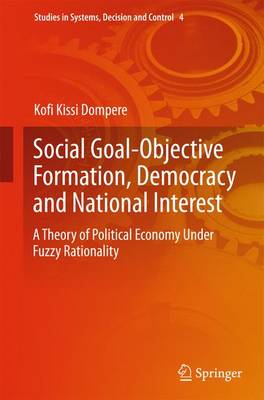Studies in Systems, Decision and Control
5 primary works
Book 4
Social Goal-Objective Formation, Democracy and National Interest
by Kofi Kissi Dompere
Book 5
This volume presents an analysis of the problems and solutions of the market mockery of the democratic collective decision-choice system with imperfect information structure composed of defective and deceptive structures using methods of fuzzy rationality.
The book is devoted to the political economy of rent-seeking, rent-protection and rent-harvesting to enhance profits under democratic collective decision-choice systems. The toolbox used in the monograph consists of methods of fuzzy decision, approximate reasoning, negotiation games and fuzzy mathematics. The monograph further discusses the rent-seeking phenomenon in the Schumpeterian and Marxian political economies where the rent-seeking activities transform the qualitative character of the general capitalism into oligarchic socialism and making the democratic collective decision-choice system as an ideology rather than social calculus for resolving conflicts in preferences in the collective decision-choice space without violence.
Book 112
The Theory of Info-Statics: Conceptual Foundations of Information and Knowledge
by Kofi Kissi Dompere
Book 114
The Theory of Info-Dynamics: Rational Foundations of Information-Knowledge Dynamics
by Kofi Kissi Dompere
This book focuses on the development of a theory of info-dynamics to support the theory of info-statics in the general theory of information. It establishes the rational foundations of information dynamics and how these foundations relate to the general socio-natural dynamics from the primary to the derived categories in the universal existence and from the potential to the actual in the ontological space. It also shows how these foundations relate to the general socio-natural dynamics from the potential to the possible to give rise to the possibility space with possibilistic thinking; from the possible to the probable to give rise to possibility space with probabilistic thinking; and from the probable to the actual to give rise to the space of knowledge with paradigms of thought in the epistemological space. The theory is developed to explain the general dynamics through various transformations in quality-quantity space in relation to the nature of information flows at each variety transformation. The theory explains the past-present-future connectivity of the evolving information structure in a manner that illuminates the transformation problem and its solution in the never-ending information production within matter-energy space under socio-natural technologies to connect the theory of info-statics, which in turn presents explanations to the transformation problem and its solution. The theoretical framework is developed with analytical tools based on the principle of opposites, systems of actual-potential polarities, negative-positive dualities under different time-structures with the use of category theory, fuzzy paradigm of thought and game theory in the fuzzy-stochastic cost-benefit space. The rational foundations are enhanced with categorial analytics.
The value of the theory of info-dynamics is demonstrated in the explanatory and prescriptive structures of the transformations of varieties and categorial varieties at each point of time and over time from parent-offspring sequences. It constitutes a general explanation of dynamics of information-knowledge production through info-processes and info-processors induced by a socio-natural infinite set of technologies in the construction-destruction space.
Book 405




